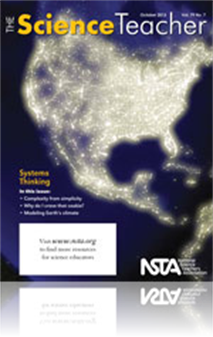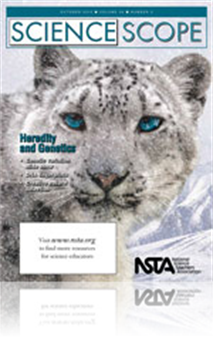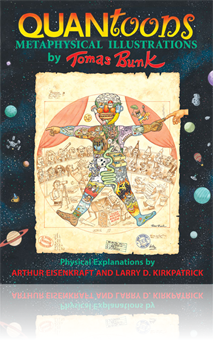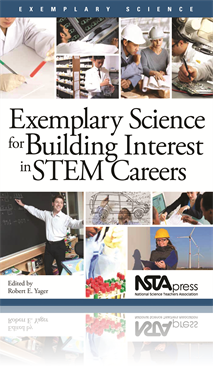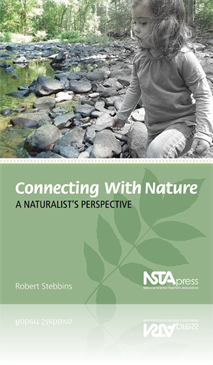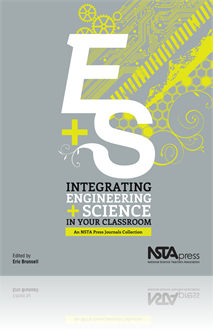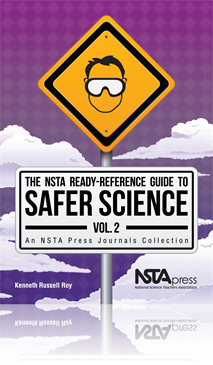All Resources
Journal Article
Experiencing Friction in First Grade
First-grade students explore friction and use technology to collect data during a unit on forces and motion....
Journal Article
This article describes an online climate change curriculum that incorporates dynamic computer models that enable students to visualize the complex interactions related to climate change science. Students learn how adjusting variables in a dynamic mod...
Journal Article
Editor's Corner: Systems Thinking
The Science Teacher’s editor shares thoughts on the current issue....
Journal Article
Phenylketonuria Genetic Screening Simulation
This article presents a hands-on, simulated screen for the inherited disease phenylketonuria. Designed as an interactive demonstration of inherited traits, this simulated screen connects real-life genetic testing with the expression of inherited trai...
Journal Article
This 10-day unit on physical and chemical changes was presented in a fifth-grade classroom. Throughout the unit students had to cite multiple indicators for physical and chemical changes. Students were also given experiences that specifically address...
Journal Article
Editor's Roundtable: Genetic Material Injected into the Headlines
Science Scope’s editor shares thoughts regarding the current issue....
Journal Article
Science 2.0: The Magic of Macrophotography
This column shares web tools that support learning. This month’s issue discusses a feature of the latest digital cameras: macrophotography....
Journal Article
This column focuses on issues related to environmentally friendly and sustainable science. This month’s issue discusses the effects of wildfires....
Journal Article
A Computer Story: Complexity From Simplicity
This article describes an activity in which students learn how complex outcomes can result from simple decisions. Participants encounter a broad range of learning experiences, including electric-circuit construction, household wiring, digital systems...
Journal Article
Teacher's Toolkit: Reading for Claims and Evidence: Using Anticipation Guides in Science
This column provides how-to strategies and practical advice for the science teacher. In this article the authors describe specific considerations for using anticipation guides in science instruction that were developed from four years of work with te...
Journal Article
This column provides classic demonstrations and experiments with a new twist. This month’s issue provides a lesson for teachers who want to use the high-interest topic of crime scene investigation for teaching across content areas....
Journal Article
Learning About Genetic Inheritance Through Technology-Enhanced Instruction
One approach that has shown potential for teaching genetics to middle school students is the use of technology-enhanced instruction, which may lead to increased visualizations. This article describes how a technology-enhanced module helped middle sch...
Journal Article
Cell Organelles and Silk Batik: A Model for Integrating Art and Science
This activity integrates science and art concepts around the theme of cell organelles using the exciting and somewhat unusual medium of painted silk batik....
Journal Article
In an attempt to integrate a geological component in a classroom investigation of biological evolution, the authors developed two activities with an interdisciplinary approach that includes the role of the environment....
Journal Article
Adding multimedia slide shows developed by the Genetic Science Learning Center as supplements to the activities you already use in your middle school classroom can help reinforce the concept that evolution is a natural process and not a response to a...
Journal Article
Teachers can use digital resources and role play to enhance student understanding of science as a human endeavor. Teaching genetics concepts through the lives of scientists allows students to have the opportunity to explore visual representations of...
Book Chapter
Iron is solid, mercury is liquid, and nitrogen is a gas. Liquid nitrogen is used to perform lots of interesting and fun experiments. Demonstrations exploiting the extreme cold of liquid nitrogen provide entertainment for children of all ages. This ch...
Book Chapter
In response to the national call for more scientists, Steppingstone School for Gifted Education responded by establishing the Steppingstone Magnetic Resonance Training (SMART) Center, which will be described in this chapter. In collaboration with Bru...
Book Chapter
The Promise of Service-Learning as an Instructional Approach to Motivate Interest in STEM Careers
While the promise of service-learning for increasing interest and achievement in mathematics and pursuing mathematical careers is apparent, little research has been conducted to show that the promise can be reached. This chapter provides the results ...
Book Chapter
Real World Externships Exposing Students to Possible Careers in STEM Disciplines
For secondary teachers of mathematics, science, and technology, Real World Externships help them answer the legitimate student query: “Why am I ever gonna need to know this?” with real challenges and problems encountered and solved in actual comp...
Book Chapter
The Talent Marketplace: Where Science Careers Are Made
In this chapter, aspects of science career planning and development are discussed from a different perspective, which at first glance may seem remote and overly theoretical. However, it is the author’s hope that, as the logic of the reasoning unfol...
Book Chapter
Scientists as Partners in K–12 Science: Engineering, Science, and Technology Careers
While scientific specialization has been responsible for many remarkable and rapid advances within scientific disciplines, this strength becomes a weakness when it comes time for members of various disciplines to cooperate. The Iowa Academy of Scienc...
Book Chapter
Science Olympiad: Inspiring the Next Generation of Scientists
As our nation faces a decline in homegrown scientists and engineers, Science Olympiad continues to provide content and experiences that motivate teachers and students to become (and remain) passionate about STEM. Science Olympiad events provide a wea...
Book Chapter
Active Learning as a Way to Interest More Students in Science Careers
In this chapter, the experiences of a science educator and two technology education (TE) classroom teachers are offered. The school is a rural middle school in a Midwestern state where authors collaborated to promote active learning environments, whi...
Book Chapter
Why STEM? Why Now? The Challenge for U.S. Education to Promote STEM Careers
The authors began this chapter with two central questions: (1) Will revitalizing STEM education, especially in America’s high schools, guarantee that graduates will choose STEM pathways in college or STEM careers when they graduate? And (2) Is it w...
Book Chapter
The authors begin the chapter with an assessment of the current state of science teaching and learning in elementary schools. This is followed by an examination of our collaborative work with elementary teachers. The authors describe their approach t...
Book Chapter
NSTA’s Efforts to Interest More K–12 Students in Pursuing STEM Careers
The National Science Teachers Association (NSTA) has inspired and coordinated science education in the United States for 64 years. As the largest professional organization in the world supporting excellence and innovation in science teaching and lear...
Book Chapter
Creating a Pipeline to STEM Careers Through Service-Learning: The AFT Program
The Academy for Future Teachers (AFT) is a STEM education and career recruitment program for Metro Atlanta high school students, hosted by Georgia State University in Atlanta, Georgia. This program was developed in response to the changing demographi...
Book Chapter
Preparing Students for Careers That Do Not Yet Exist
The Illinois Mathematics and Science Academy (IMSA), as a self-described “teaching and learning laboratory for imagination and inquiry,” has a history of pursuing innovations closely aligned with the vision and framework of the National Science E...
Book Chapter
Learning From Successful Cooperative Models
Since some schools lack even a modest representation of free-living animal and plant life, it is important that school districts consider giving high priority to the establishment of cooperative off-campus teaching and research areas for nature studi...
Book Chapter
Listening In on a Naturalist’s Experiences
Field trips that focus primarily on wild nature are one of the quickest ways to start the nature-bonding process. The chapter details a field trip the author conducted in which he used a hands-on approach to get students directly involved, as well as...
NSTA Press Book
Integrating Engineering and Science in Your Classroom
“I still remember my very first day as a teacher. A few days earlier, my principal had given me advice: ‘Whatever you do, do not start with an overview of your course. Do something active and set the tone….’ As I nervously awaited the arrival...
eBook
Integrating Engineering and Science in Your Classroom (e-book)
“I still remember my very first day as a teacher. A few days earlier, my principal had given me advice: ‘Whatever you do, do not start with an overview of your course. Do something active and set the tone….’ As I nervously awaited the arrival...
eBook
Exemplary Science for Building Interest in STEM Careers (e-book)
National standards encourage science teachers to help “increase student economic productivity through the use of the knowledge, understandings, and skills of the scientifically literate person in their careers.” Exemplary Science for Building Int...
Book Chapter
Introduction To Safety In Science
This sample chapter provides an overview of general safety practices for the classroom. Topics discussed are Making Adjustments for Mobility- Impaired Students, Laboratory Safety: Welcome Aboard!, Yes, You Need a Chemical Hygiene Officer, NSTA’s Po...
Book Chapter
Get a Grip! A Middle School Engineering Challenge
Get a Grip! is a problem-based unit that places middle school students in the role of engineers who are challenged to design and construct prosthetic arms for amputees in a war-torn country. The students use common materials to build arms that accomp...




